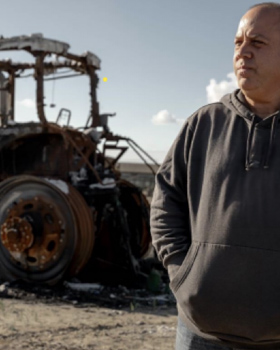Apr 2, 2024
JFNA Provides $12.5 Million to Help Israeli Farmers Replace Lost Equipment

As Israeli famers begin the planting season this month, the Jewish Federations of North America (JFNA) has provided $12.5 million to help those in the devastated western Negev communities purchase vital agricultural equipment.
Beyond the sheer death and destruction, heinous sexual assaults and widespread abductions at the hands of Hamas on October 7, the terrorists also targeted farm equipment, infrastructure and farmworkers. They stole or destroyed everything in their path, from irrigation pipes and computers to tractors and specialized farming vehicles. It was all part of a coordinated effort to shake the identity and economy of the western Negev and the food security of Israel. They also kidnapped and killed foreign workers and Israelis, demolishing their homes and the farms that they worked for decades to build.
The kibbutzim, moshavim and independent farms of the western Negev make the desert bloom and have been a source of national and Zionist pride for decades. These farms supply 75 percent of Israel’s vegetables and 20 percent of fruit, as well as other products. Recognizing that full continuation of agriculture is essential for the recovery of these communities, as well as Israel’s national security, JFNA is partnering with ReGrow Israel to give farmers the critical dollars they need to purchase new equipment and rebuild infrastructure. The $12.5 million, advanced through JFNA’s Israel Emergency Fund, for which Federation raised nearly $30 million, will supplement another $12 million being supplied by the Israeli government.
“Hamas came to destroy our identity, our community and our agriculture. Our victory is to go back to our fields and make them green again,” said Moran Freibach of Kibbutz Nahal Oz. Freibach was directly impacted by the terrorist attacks on October 7 when Hamas raided his kibbutz and murdered friends and family members. Courageously, he returned shortly afterwards to fulfill his duties as Head of Agriculture and take on the additional role of Head of Security. Upon his return, he saw the systematic nature of Hamas’ destruction of agriculture — including livestock, equipment and every one of the kibbutz’s computer-controlled irrigation boxes. In an act of defiance and resilience, he replanted every furrow of wheat to the edge of the kibbutz near the Gaza border, even while under fire and with the protection of a tank. Despite enduring unfathomable suffering and the destruction at Kibbutz Nahal Oz, Freibach remains resolute in his determination to rebuild and restore the land.







